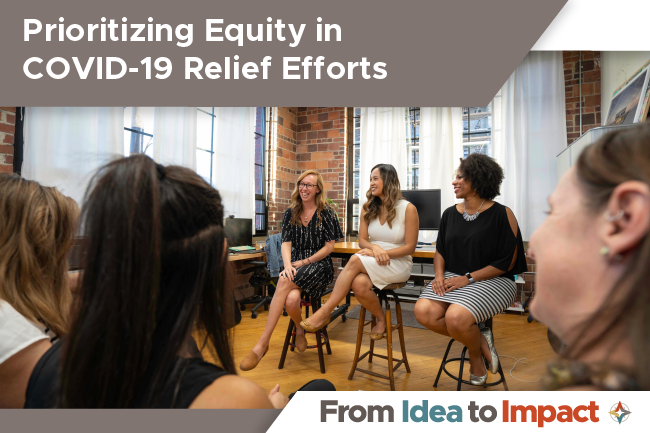Prioritizing Equity in COVID-19 Relief Efforts

As the coronavirus pandemic has unfolded, philanthropists and foundations have found numerous ways to respond, providing fast relief to a variety of communities. Our learning and evaluation team were curious about how philanthropy was managing to respond successfully to rapidly emerging needs, so we looked to Arabella’s own support of philanthropists pivoting to respond to the COVID crisis to learn more.
Arabella has worked closely with our clients to determine the best way for them to give during this crisis, helping them match their values with urgent developing needs. Our clients have provided PPE, ventilators, and other medical supplies to hard hit communities; removed reporting requirements and restrictions on funds to existing grantees and moved up the timing of future grant cycles; created funds to support small businesses forced to shut down due to stay at home orders; expanded their portfolios to include giving in sectors hardest hit by COVID-19; and facilitated direct cash transfers to individuals and families, including those without access to a bank account.
While the sector, scope, and ultimate goals of these projects varied, there was one common thread across them all: the need to center equity in response efforts in order to best identify real community needs, improve assessment and decision-making processes, and effectively accelerate relief.
As the COVID-19 crisis has unfolded, the importance of this approach, which entails intentionally cultivating empathy and acknowledging and addressing power dynamics, has only become more evident. In reviewing the recent work our firm has been doing to support philanthropies with their COVID-related giving, we have quickly identified some smart practices that we recommend other funders keep in mind as they consider any relief effort.
- Listen and learn from the people and communities you wish to help: Before deciding on how to deliver relief, philanthropies are prioritizing hearing about the greatest challenges and emerging needs directly from those most impacted. Without centering those perspectives, you run the risk of missing the mark with your giving.
- Identify gaps in the existing social safety net: In any system of supports, there are people who fall through the cracks. Savvy philanthropists know that the most impactful giving gets to those who are missed by traditional support efforts. This requires looking closely at the organizations and philanthropic partnerships and platforms already at work in any area.
- Do your research to understand the broader implications of your assistance: For example, eligibility requirements for public assistance are complex and vary from place to place. Before deciding on a method of giving, philanthropies should always work to ensure that accepting relief from them will not disqualify recipients from other urgently needed assistance.
- Think carefully about process: In addition to what you decide to do, how you decide to do it is crucial to ensure your giving is equitable. Even the best-intentioned relief efforts can fall short when strong process is not in place. Before deciding on a course of action, philanthropies should analyze who they will provide relief to, through what platforms, how they will access it, and whether any additional support should be provided to ensure recipients get the full intended benefits of their giving.
In the end, bringing an equity lens to bear throughout philanthropic work is essential to responding both effectively and quickly to support communities in times of crisis. As the recent work of many of our clients shows, these goals—moving quickly, moving effectively, and centering equity—are by no means mutually exclusive. Just the opposite: they are often all necessary factors for accomplishing real impact goals.
About the Authors: Shannon Stagman, M.A., is an Associate Director and member of Arabella Advisors’ Learning and Evaluation practice. Julie Slay, PhD, has led the Learning and Evaluation Practice for six years. She and her team help philanthropists and their partners to reflect and learn by gathering, organizing, and synthesizing relevant information to help them go from idea to impact.
